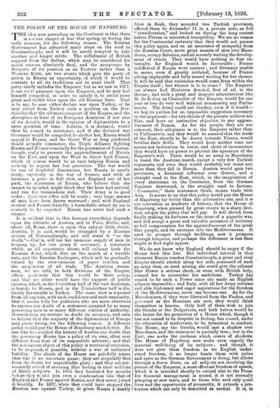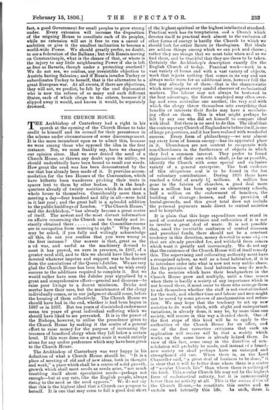THE POLICY OF THE HOUSE OF HAPSBURG.
THE idea now prevailing on the Continent is that there is serious danger of war this spring, or during the early summer, for the following reason. The Russian Government has advanced many steps on the road to Constantinople, and it will be sorely tempted to take another and longer stride. The withdrawal of British support from the Sultan, which may be considered for moral reasons absolutely final, and the acceptance by Bulgaria of its position as an Eastern rather than a lArestern State, are two events which give the party of action in Russia an opportunity, of which it would be contrary to all its traditions not to avail itself. That party rarely includes the Emperor, but as we saw in 1877, it can exert pressure upon the Emperor, and he may feel himself compelled, in order to satisfy it, to strike some great and visible blow upon the old Russian lines. That is to say, he may either declare war upon Turkey, or he may extort from Turkey such a position on the Dar- danelles that the ultimate conquest of the Empire, and the absorption at least of its European dominion if not also of its Asiatic, would in the opinion of diplomatists be a mere question of time. Austria, it is declared, would then be roused to resistance, and if she declared war Germany would be compelled to shelter her, Russia would appeal to France, and the Great War so long predicted would actually commence, the Triple Alliance fighting Russia and France nominally for the possession of Constan- tinople, really to prevent the aggrandisement of Russia on the East, and upon the West to throw back France, which of course would be at once helping Russia and seeking to regain her lost provinces. The war would be one of frightful dimensions, but Russia is nearly ready, especially in the way of finance, and with so immense a prize in full view, and England out of her %path, the statesmen of Russia, who believe that she ,cannot be invaded, might think that the hour had arrived, and run the tremendous risk. Their Army is in good .order ; their new rifles will be ready ; very large masses of men have been drawn westward ; and, with England neutral and France friendly. a formidable attack by sea is -scarcely to be expected. Russia has never had such a chance.
It is evident that in this forecast everythine. depends .upon the attitude of Austria, and in Paris, Berlin, and, above all, Rome, there is upon this subject little doubt. Austria, it is said, would be strangled by a Russian .seizure of Constantinople, and will resist it " to the -death,"—that is, will use her immense supply of men in keeping up, for two years if necessary, a resistance which, as all experience shows, will exhaust both the Russian Army, which dies on the march at a terrible rate, and the Russian Exchequer, which will be gradually rained by the over-emission of paper roubles, and the suspension of all trade. The Austrian states- men, we are told, in both divisions of the Empire, affirm positively that this would be their policy, and that no other would have the support of public opinion, which, in the Cisleithan half of the vast dominion, is hostile to Russia, and in the Transleithan half is dis- tinctly favourable to Turkey. The same view is repeated from all capitals, with such confidence and such unanimity, that it seems folly for publicists who are mere observers to express any doubt of a statement accepted by so many governing men in so many different centres of authority. Nevertheless, we venture to doubt its accuracy, and even to believe that the majority of the diplomatists of Europe may prove wrong, for the following reason. A different policy would pay the House of Hapsburg much better. No one who has studied the history of Austria can doubt that the governing House has a policy of its own, often very different from that of its responsible advisers ; and that the permanent object of this policy is territorial extension, to be acquired, it possible, without a war of unlimited liability. The chiefs of the House are painfully aware that war is an uncertain game; they are singularly free from the desire for unprofitable glory ; and they are per. ana.nently afraid of arousing Slav feeling in their millions of Slavic subjects. In 1855 they hesitated for months -before they would join even a combination like that of England and France against Russia, and they never joined it heartily. In 1877, when they could have stopped the Russian war against Turkey, or given Russia a deadly blow in flank, they accepted two Turkish provinces, offered them by Alexander IL in a private note, as full " consideration," and looked on during the long contest before Plevna, in interested tranquillity. We see no reason for the Continental certainty that they would not pursue this policy again, and on an assurance of sympathy from the Russian Court, move great masses of men into Mace- donia, occupy Salonica, and sit serenely waiting the develop- ment of events. They would have nothing to fear ex- ternally, for England would be favourable ; France indifferent if Russia were content ; and Germany unable to move, even if greatly irritated, because of France sitting implacable and fully armed waiting for her chance. It will be said that resistance would come from within the Empire itself ; but whence is it to come ? The Emperor San always find Ministers devoted, first of all, to the throne ; and with a great and despotic administrator like M. de Kallay as Chancellor of the Empire, would for one year or two do very well without summoning any Parlia- ments. The Army could not disobey, even if it would— we beg its pardon for an impossible suggestion necessary to the argument—for two-thirds of the private soldiers are Slav, and have no instinctive objection to any aggran- disement of Russia. As for the people, they are not coherent, their allegiance is to the Emperor rather than to Parliaments, and they would be assured that the trade of the East, shortly to be drawn towards Vienna, would fertilise their fields. They would have neither time nor means nor inclination to resist, and short of insurrection they would have no power to prevent the operation of the Emperor's will. There would be no army in Macedonia to resist the Austrian march, except a very few Turkish regiments, and even they would probably not resist any more than they did in Bosnia. Austria would gain two provinces, a dominant influence over Greece, and a straight road to the East, which, in the imagination of every statesman on the Continent, from the German Emperor downward, is the straight road to fortune. " Commerce," these statesmen think, means trade with Asia. It seems to us that this policy would pay the House of Hapsburg far better than the alternative one, and it is our conviction as students of history, that the House of Hapsburg, when pressed by great events to a sharp deci- sion, adopts the policy that will pay. It will shrink from finally staking its fortunes on the issue of a gigantic war, and will accept a great and valuable accession of territory as full compensation for the aggrandisement of the great Slav people, and its entrance into the Mediterranean. It used to prosper through weddings, now it prospers through bargains, and perhaps the difference is less than might at first sight appear.
We do not know why England should be angry if the House took this line. Her individual interest is that whenever Russia reaches Constantinople, a great and rival Empire should stretch along her side, possessed of such an army that, on need arising, she could give the colossal Slav Power a serious check, or even, with British help, compel her to reconsider her ambitions. Turkey has ceased to be such a Power since she made an English alliance impossible ; and Italy, with all her Army reforms and able diplomacy and eager aspirations for the freedom of the Mediterranean, never can become one. As for the Macedonians, if they were liberated from the Pashas, and governed as the Bosnians are now, they would think themselves in heaven. Only half of them wish to join the Greeks or the Bulgarians, and both halves would be the better for the protection of a House which, though it has not ceased to be despotic in feeling, has ceased, under the education of misfortune, to be tyrannical in conduct. The House, say the Greeks, would cast a shadow over Macedonia, and the statement is partially true; but in the East, one seeks the coolness which comes of shadows. The House of Hapsburg now seeks even eagerly the material well-being of its subjects ; and though it does not give them freedom as we English under- stand freedom, it no longer hunts them with police and spies as the German Government is doing, but allows through a dozen Diets, on all subjects not involving the person of the Emperor, a most effectual freedom of speech, which it is intended shortly to extend also to the Press. Its financial management is sound, it is not eternally grasping at new taxes, and to those who seek only quiet lives and the opportunity of prosperity, it extends a pro- tection which can only be described as cordial. It is, in fact, a good Government for small peoples to grow strong under. Every extension will increase the disposition of the reigning House to conciliate each of its peoples, while no extension will set it free to run a career of ambition or give it the smallest inclination to become a world-wide Power. We should greatly prefer, no doubt, to see a federation of the Balkans ; but with Russia moving on Constantinople, what is the chance of that, or where is the injury to any little neighbouring Power if she is left as free as Bavaria, though under a protecting overlord? We do not see, we confess, any irresistible objection to Austria having Salonica; and if Russia invades Turkey or subordinates Turkey to herself, that is the alternative to a great European war. At all events, if there are objections, they will not, we predict, be felt by the cool diplomatist who is now the referee of so many and such different States, each of which clings to the others, because if it slipped away it would, and knows it would, be separately drowned.



































 Previous page
Previous page